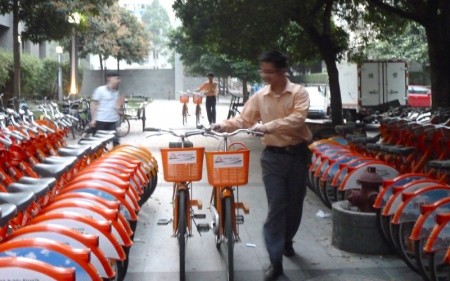You’ve probably heard about car-choked streets and traffic in China’s cities. But bikes are back in vogue, and bike-sharing has become a viral phenomenon.

According to a recent Bloomberg report, China is home to more than 650,000 public bicycles—only seven years after the country started its bike programs. The largest Chinese system, in Hangzhou, has 65,000 bikes. The largest western bike-sharing network, in Paris, pales in comparison, with only 20,600 bikes.
Why should we be cheering this new bike rage? Because air pollution in China’s cities has reached “airpocolypse” levels: In January 2014, levels of PM2.5, or fine particulate matter, concentrations hit higher than 500, surpassing the limits of the measurement scale. The World Health Organization uses 25 as its baseline for acceptable healthy levels of PM2.5, which is considered the best indicator of assessing health impacts from air pollution.
The good news is that Premier Li Keqiang declared a “war on pollution” in March 2014, saying China will reduce emissions from coal plants and remove old and dirty vehicles from roads. With China now encouraging its citizens to move towards cities in a massive urbanization campaign, bike sharing in China will hopefully continue to grow.


